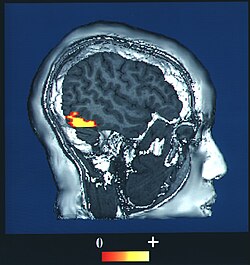Prosopagnosia
(Redirected from Congenital prosopagnosia)
Editor-In-Chief: Prab R Tumpati, MD
Obesity, Sleep & Internal medicine
Founder, WikiMD Wellnesspedia &
W8MD medical weight loss NYC and sleep center NYC
| Prosopagnosia | |
|---|---|

| |
| Synonyms | Face blindness |
| Pronounce | N/A |
| Specialty | N/A |
| Symptoms | Inability to recognize faces |
| Complications | N/A |
| Onset | Can be congenital or acquired |
| Duration | Lifelong |
| Types | N/A |
| Causes | Genetic disorder, brain injury |
| Risks | Autism spectrum disorder, Turner syndrome |
| Diagnosis | Neuropsychological test |
| Differential diagnosis | Visual agnosia, Capgras delusion |
| Prevention | N/A |
| Treatment | Cognitive therapy, compensatory strategies |
| Medication | N/A |
| Prognosis | N/A |
| Frequency | 2.5% of the population |
| Deaths | N/A |
Prosopagnosia
Prosopagnosia, also known as face blindness, is a cognitive disorder characterized by an inability to recognize faces. This condition can be congenital or acquired due to brain injury. Individuals with prosopagnosia may have difficulty recognizing familiar faces, including their own, and may rely on other cues such as voice, clothing, or distinctive features to identify people.
Epidemiology
Prosopagnosia affects approximately 2% of the general population. It can occur in both children and adults, and there is evidence to suggest a genetic component, as it sometimes runs in families.
Etiology
Prosopagnosia can be classified into two main types:
- Congenital Prosopagnosia: This form is present from birth and is not associated with any brain damage. It is believed to have a genetic basis.
- Acquired Prosopagnosia: This form occurs as a result of brain injury, such as a stroke, traumatic brain injury, or neurodegenerative diseases. It is often associated with damage to the fusiform gyrus, a region of the brain involved in facial recognition.
Pathophysiology
The fusiform gyrus, located in the temporal lobe of the brain, plays a crucial role in facial recognition. Damage to this area can disrupt the ability to process and recognize faces. In congenital prosopagnosia, the exact neural mechanisms are not fully understood, but it is thought to involve atypical development of the neural networks responsible for face processing.
Clinical Features
Individuals with prosopagnosia may exhibit the following symptoms:
- Difficulty recognizing familiar faces, including family members and friends.
- Inability to recognize one's own face in photographs or mirrors.
- Reliance on non-facial cues for identification, such as voice, hairstyle, or clothing.
- Social anxiety or avoidance due to difficulties in social interactions.
Diagnosis
Diagnosis of prosopagnosia typically involves a combination of clinical assessment and neuropsychological testing. Tests may include:
- Face recognition tests, where individuals are asked to identify or match faces.
- Memory tests to rule out general memory deficits.
- Brain imaging studies, such as MRI or CT scan, to identify any structural abnormalities.
Management
There is currently no cure for prosopagnosia, but several strategies can help individuals cope with the condition:
- Use of alternative identification strategies, such as focusing on distinctive features or using verbal descriptions.
- Social skills training to improve confidence in social interactions.
- Technological aids, such as facial recognition software, to assist in identifying people.
Prognosis
The prognosis for individuals with prosopagnosia varies depending on the type and severity of the condition. Those with congenital prosopagnosia may develop compensatory strategies over time, while those with acquired prosopagnosia may experience improvement if the underlying cause is treatable.
See Also
External Links
- [Prosopagnosia Research Centers]
- [Support Groups for Face Blindness]
Transform your life with W8MD's budget GLP-1 injections from $125.
W8MD offers a medical weight loss program to lose weight in Philadelphia. Our physician-supervised medical weight loss provides:
- Most insurances accepted or discounted self-pay rates. We will obtain insurance prior authorizations if needed.
- Generic GLP1 weight loss injections from $125 for the starting dose.
- Also offer prescription weight loss medications including Phentermine, Qsymia, Diethylpropion, Contrave etc.
NYC weight loss doctor appointments
Start your NYC weight loss journey today at our NYC medical weight loss and Philadelphia medical weight loss clinics.
- Call 718-946-5500 to lose weight in NYC or for medical weight loss in Philadelphia 215-676-2334.
- Tags:NYC medical weight loss, Philadelphia lose weight Zepbound NYC, Budget GLP1 weight loss injections, Wegovy Philadelphia, Wegovy NYC, Philadelphia medical weight loss, Brookly weight loss and Wegovy NYC
|
WikiMD's Wellness Encyclopedia |
| Let Food Be Thy Medicine Medicine Thy Food - Hippocrates |
Medical Disclaimer: WikiMD is not a substitute for professional medical advice. The information on WikiMD is provided as an information resource only, may be incorrect, outdated or misleading, and is not to be used or relied on for any diagnostic or treatment purposes. Please consult your health care provider before making any healthcare decisions or for guidance about a specific medical condition. WikiMD expressly disclaims responsibility, and shall have no liability, for any damages, loss, injury, or liability whatsoever suffered as a result of your reliance on the information contained in this site. By visiting this site you agree to the foregoing terms and conditions, which may from time to time be changed or supplemented by WikiMD. If you do not agree to the foregoing terms and conditions, you should not enter or use this site. See full disclaimer.
Credits:Most images are courtesy of Wikimedia commons, and templates, categories Wikipedia, licensed under CC BY SA or similar.
Contributors: Prab R. Tumpati, MD

